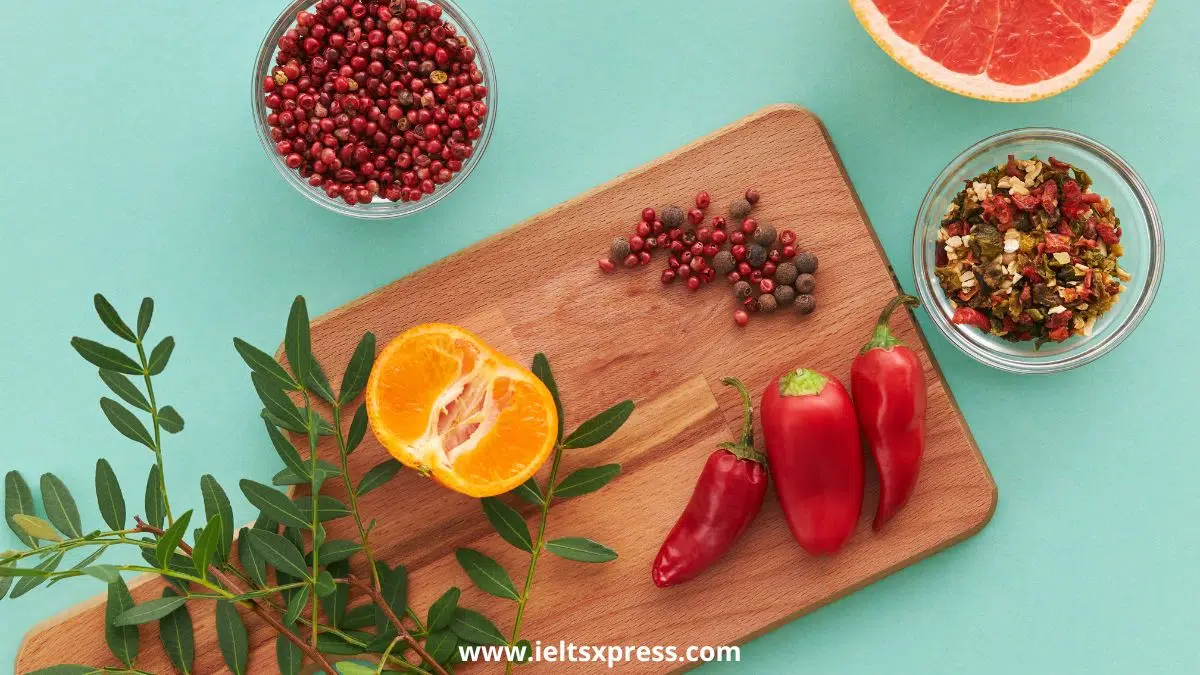The Flavour Industry IELTS Reading Academic with Answers
Reading Passage 1
You should spend about 20 minutes on Questions 1-11, which are based on Reading Passage below.
Real IELTS Exam Question, Reported On:
Practice with Expert IELTS Tutors Online
Apply Code "IELTSXPRESS20" To Get 20% off on IELTS Mock Test
| India | 16th June 2022 |
The Flavour Industry
A. Read through the nutritional information on the food in your freezer, refrigerator or kitchen pantry, and you are likely to find a simple, innocuous-looking ingredient recurring on a number of products: “natural flavour”. The story of what natural flavour is, how it got into your food, and where it came from is the result of more complex processes than you might imagine.
B. During the 1980s, health watchdogs and nutritionists began turning their attention to cholesterol, a waxy steroid metabolite that we mainly consume from animal-sourced products such as cheese, egg yolks, beef, poultry, shrimp, and pork. Nutritionists blamed cholesterol for contributing to the growing rates of obesity, heart disease, diabetes, and several cancers in Western societies. As extensive recognition of the matter grew amongst the common people, McDonalds stopped cooking their french fries in a mixture of cottonseed oil and beef tallow, and in 1990, the restaurant chain began using 100% vegetable oil instead.
C. This substantially lowered the amount of cholesterol in McDonalds’ fries, but it created a new dilemma The beef tallow and cottonseed oil mixture gave the French fries high cholesterol content, but it also gifted them with a rich aroma and “mouth-feel” that even James Beard, an American food critic, admitted he enjoyed. Pure vegetable oil is bland in comparison. Looking at the current ingredients’ list of McDonalds’ French fries, however, it is easy to see how they overcame this predicament Aside from a few preservatives, there are essentially three main ingredients: potato, soybean oil, and the mysterious component of “natural flavour”. ieltsx press
D. Natural flavour also entered our diet through the rise in processed foods, which now make up over 90% (and growing) of the American diet, as well as representing a burgeoning industry in developing countries such as China and India Processed foods are essentially any foods that have been boxed, bagged, canned or packaged, and have a list of ingredients on the label. Sometimes, the processing involves adding a little sodium or sugar, and a few preservatives. Often, however, it is coloured, bleached, stabilized, emulsified, dehydrated, odour-concealed, and sweetened. This process typically saps any original flavour out of the product, and so, of course, flavour must be added back in as well.
E. Often this is “natural flavour”, but while the term may bring to mind images of fresh barley, hand-ground spices, and dried herbs being traded in a bustling street market, most of these natural sources are, in fact, engineered to culinary perfection in a set of factories and plants off the New Jersey Turnpike outside of New York. Here, firms such as International Flavors & Fragrances, Harmen & Keimer, Flavor Dynamics, Frutarom and Elan Chemical isolate and manufacture the tastes that are incorporated in much of what we eat and drink. The sweet, summery burst of naturally squeezed orange juice, the wood-smoked aroma in barbeque sauces, and the creamy, buttery, fresh taste in many dairy products do not come from sundrenched meadows or backyard grills but are formed in the labs and test tubes of these flavour industry giants. IELTSXpress.com
F. The scientists – dubbed “flavourists” who create the potent chemicals that set our olfactory senses to overdrive use a mix of techniques that have been refined over many years. Part of it is dense, intricate chemistry: spectrometers, gas chromatographs, and headspace-vapour analysers can break down components of a flavour in amounts as minute as one part per billion. Not to be outdone, however, the human nose can isolate aromas down to three parts per trillion. Flavourists, therefore, consider their work as much an art as a science, and flavourism requires a nose “trained” with a delicate and poetic sense of balance.
G. Should we be wary of the industrialisation of natural flavour? On its own, the trend may not present any clear reason for alarm. Nutritionists widely agree that the real assault on health in the last few decades stems from an “unholy trinity” of sugar, fat, and sodium in processed foods. Natural flavour on its own is not a health risk. It does play a role, however, in helping these processed foods to taste fresh and nutritious, even when they are not. So, while the natural flavour industry should not be considered the culprit, we might think of it as a willing accomplice. ielts xpress
Questions 1-8
Reading Passage has seven paragraphs, A-G.
Which paragraph contains the following information?
Write the correct letter. A-G, in boxes 1-8on your answer sheet
NB You may use any letter more than once.
1. examples of companies that create natural flavours
2. an instance of a multinational franchise responding to public pressure
3. a statement on the health effects of natural flavours
4. an instance where a solution turns into a problem
5. a place in the home where one may encounter the term “natural flavour”
6. details about die transformation that takes place in processed grocery items
7. a comparison of personal and technological abilities in flavour detection
8. examples of diet-related health conditions
Questions 9-12
Do the following statements agree with the information given in Reading Passage?
In boxes 9-13on your answer sheet, write
TRUE if the statement agrees with the information
FALSE if the statement contradicts with the information
NOT GIVEN if there is no information on this
9. On their own, vegetable oils do not have a strong flavour.
10. Soybean oil is lower in cholesterol than cottonseed oil.
11. Processed foods are becoming more popular in some Asian countries.
12. All food processing involves the use of natural flavours.
Question 13
Choose the correct letter. A, B.C, or D.
Write the correct letter in box 26 on your answer sheet
13. The writer of Reading Passage concludes that natural flavours ________
A. are the major cause of dietary health problems.
B. are unhealthy, but not as had as sugar, fat, and sodium.
C. have health benefits that other ingredients tend to cancel out.
D. help make unhealthy foods taste better.
The Flavour Industry IELTS Reading Answers
1. E
2. B
3. G
4. C
5. A
6. D
7. F
8. B
9. TRUE
10. NOT GIVEN
12. TRUE
12. FALSE
13. D
The Flavour Industry IELTS Reading Answers Explanation
Question 1: examples of companies that create natural flavors
Answer: E
Supporting Statement: “firms such as International Flavors & Fragrances, Harmen & Keimer, Flavor Dynamics, Frutarom and Elan Chemical isolate and manufacture the tastes that are incorporated in much of what we eat and drink”
Keyword: Firms, manufacture
Keyword location: Para E, line 4
Explanation: The firms like International Flavors & Fragrances, Harmen & Keimer, Flavor Dynamics, Frutarom, and Elan Chemical manufactures natural flavors.
Question 2: an instance of a multinational franchise responding to public pressure
Answer: B
Supporting Statement: “Mcdonald’s stopped cooking their french fries in a mixture of cottonseed oil and beef tallow, and in 1990, the restaurant chain began using 100% vegetable oil instead.”
Keywords: McDonald’s
Keyword location: Para B, line 5
Explanation: As a response to public pressure, the multinational franchise McDonalds has stopped cooking French fries in a mixture of cottonseed oil and beef tallow, instead they are using 100% vegetable oil ieltsxpress
Question 3: a statement on the health effects of natural flavors
Answer: G
Supporting Statement: “Natural flavor on its own is not a health risk”
Keywords: natural flavor, not a health risk
Keyword location: para G, line 3
Explanation: It has been said that natural flavor, on its own, does not have any health risk.
Question 4: an instance where a solution turns into a problem
Answer: C
Supporting Statement: “This substantially lowered the amount of cholesterol in McDonald’s’ fries, but it created a new dilemma The beef tallow and cottonseed oil mixture gave the French fries high cholesterol content, but it also gifted them with a rich aroma and “mouth-feel” that even James Beard, an American food critic, admitted he enjoyed”
Keywords: The beef tallow and cottonseed oil mixture, high cholesterol content, but it also gifted them with a rich aroma and “mouth-feel
Keyword location: para c, line 1
Explanation: McDonalds’ lowered the cholesterol content in their French fries by using 100% vegetable oils, but the beef tallow and cottonseed oil gave the French fries a rich aroma and mouthfeel. IELTSXPRESS
Question 5: a place in the home where one may encounter the term “natural flavor”
Answer: A
Supporting Statement: “Read through the nutritional information on the food in your freezer, refrigerator, or kitchen pantry, and you are likely to find a simple, innocuous-looking ingredient recurring on a number of products: “natural flavor”
Keyword: natural flavor
Keyword location: para A, line 1
Explanation: the places where one may find natural flavor in the home are the freezer, refrigerator, or kitchen pantry.
Question 6: details about die transformation that takes place in processed grocery items
Answer: D
Supporting Statement: Processed foods are essentially any foods that have been boxed, bagged, canned or packaged, and have a list of ingredients on the label“
Keywords: Processed
Keyword location: Para D. line 3
Explanation: The food that has been boxed, bagged, canned or packaged, that has a list of ingredients on its label is processed food.
Question 7: a comparison of personal and technological abilities in flavor detection
Answer: F
Supporting Statement: “Part of it is dense, intricate chemistry: spectrometers, gas chromatographs, and headspace-vapor analyzers can break down components of a flavor in amounts as minute as one part per billion. ”
Keywords: components
Keyword location: Para F, line 2
Explanation: The spectrometers, headspace-vapor, gas chromatographs can break the components of a flavor into pieces as one part per billion.
Question 8: examples of diet-related health conditions
Answer: B
Supporting Statement: “Nutritionists blamed cholesterol for contributing to the growing rates of obesity, heart disease, diabetes, and several cancers in Western societies.”
Keywords: blamed cholesterol, heart disease, diabetes, obesity
Keyword location: para B, line 3
Explanation: In western countries, the nutritionist blamed cholesterol for all kinds of health issues like obesity, heart diseases. Diabetes and several cancers.
Question 9: On their own, vegetable oils do not have a strong flavor
Answer: True
Supporting Statement: “Pure vegetable oil is bland in comparison. ”
Keywords: bland in comparison
Keyword location: Para C, line 4
Explanation: The vegetable oil do not have a strong flavor and are bland in comparison
Question 10: Soybean oil is lower in cholesterol than cottonseed oil.
Answer: Not Given
Question 11: Processed foods are becoming more popular in some Asian countries.
Answer: True
Supporting Statement: “Natural flavor also entered our diet through the rise in processed foods, which now make up over 90% (and growing) of the American diet, as well as representing a burgeoning industry in developing countries such as China and India ”
Keywords: entered our diet, China, India
Keyword location: para D, line 1
Explanation: Processed foods have entered our diet along with the natural flavor in countries like China and India
Question 12: All food processing involves the use of natural flavors.
Answer: False
Supporting Statement: “This process typically saps any original flavor out of the product, and so, of course, flavor must be added back in as well.”
Keywords: saps any original flavor out
Keyword location: Para D, last line
Explanation: While the foods are being processed, It washes all the original flavor and some artificial flavors are added back.
Question 13: The writer of Reading Passage 2 concludes that natural flavors ________
Answer: D
Supporting Statement: “while the natural flavor industry should not be considered the culprit, we might think of it as a willing accomplice.”
Keywords: natural flavor industry
Keyword location: Para G, last line
Explanation: The natural flavor helps in making unhealthy food taste better.
Also Check: Deafhood IELTS Reading Academic with Answers




